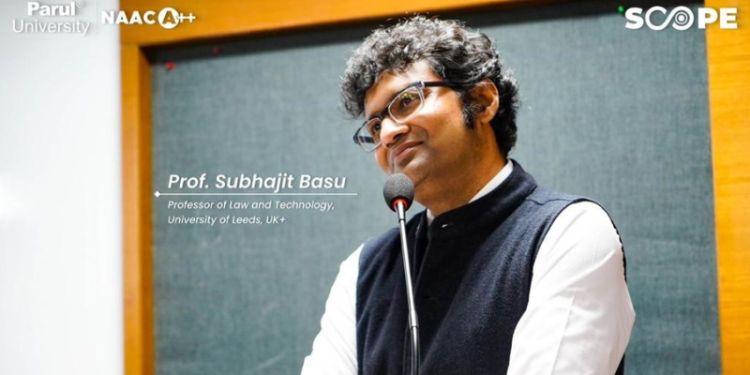School of Law Professor calls for the dismantling of the colonial underpinnings of AI technology

On a dissemination trip to India, Prof Subhajit Basu explored the entrenched colonialism in AI governance and made a clarion call for a more democratised approach that reflects global perspectives
As part of his recent research dissemination trip to India, Professor Subhajit Basu presented at two major international conferences. His focus at both was on AI governance's critical and evolving field, emphasising the need for equitable and inclusive frameworks.
The first, the International Conference on Cyberlaw, Cybercrime & Cybersecurity, was held in New Delhi between the 29th November and 1st December 2023. It brought together a diverse group of international delegates, speakers, and representatives from the Indian Diaspora, encompassing stakeholders from the digital ecosystem.
Professor Basu gave a lecture titled ‘Reimagining AI Governance Beyond Colonial Shadows: Pathways to an Equitable Tech Future’, in which he addressed the pressing issue of AI governance and highlighted the importance of moving beyond the historical colonial influences that have shaped global technology policy.
He says:
The current marginalisation of the Global South in AI discourse isn't just problematic; it threatens to exacerbate existing digital and socioeconomic divides. This is a clarion call for a more democratised approach to AI, one that ensures its development and governance are attuned to the diverse needs and rights of all nations, not just those in the Global North. AI must evolve from being a tool of dominance to a catalyst for inclusive global progress.
On January 23rd, 2024, he was the keynote speaker at the plenary session of the conference Navigating the Intersection of AI and Law, which was organised by Aligarh Muslim University, Uttar Pradesh. His speech, described by the conference organisers as ‘the highlight of the conference’ revolved around the importance of a decolonial approach to AI governance.
Titled ‘AI Governance (Redefined?): A Focus on the Global South’, his keynote investigated how AI governance can be reimagined, particularly from the perspective of the Global South.
He stated that there is a need for integrating diverse cultural, social, and ethical perspectives, especially from historically marginalised regions. He emphasised the need for equitable access to AI technologies worldwide and for fostering local AI industries and research communities in these regions.
Both his lecture and his keynote speech were based on his ongoing research with Dr Adekemi Omotubora and their forthcoming chapter: ‘Decoding and Reimagining AI Governance Beyond Colonial Shadow’. In: Paul R; Carmel E; Cobbe J (eds.) Handbook on Public Policy and Artificial Intelligence (Edward Elgar, 2024).
During this same trip, Professor Basu was welcomed to an event titled ‘Think Legal Nexus’ at Parul University, where he presented an in-depth exploration of the complex intersection of AI and law in the digital era. He was also invited as a Guest Speaker by the VC of West Bengal National University of Juridical Science, Prof Nirmal Kanti Chakrabarti, and spoke on ‘Equitable Tech Future again focusing on Global South’.
Professor Basu is a member of the Centre for Business Law Practice.
To keep up with more of Professor Basu’s incredible work, including his recent interview for The Economic Times and his opinion on the NHS’s new data contract, you can find him on X: basu_subhajit and LinkedIn: Subhajit Basu.




